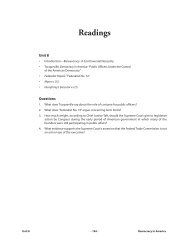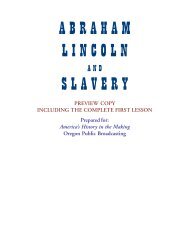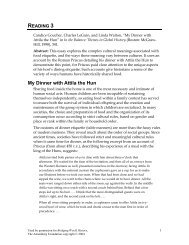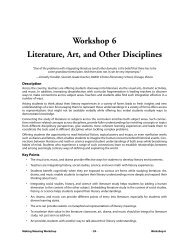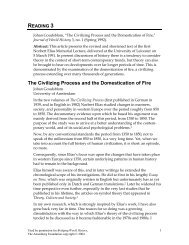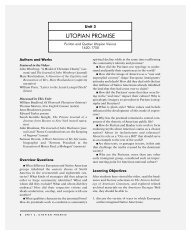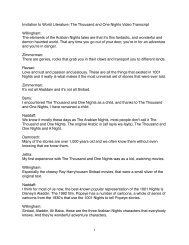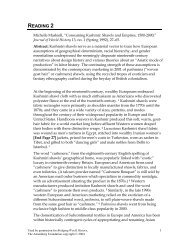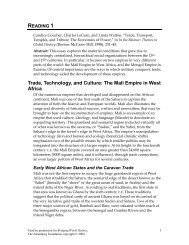The New Imperialism in Africa
The New Imperialism in Africa
The New Imperialism in Africa
Create successful ePaper yourself
Turn your PDF publications into a flip-book with our unique Google optimized e-Paper software.
READING 2<br />
Candice Goucher, Charles LeGu<strong>in</strong>, L<strong>in</strong>da Walton, In the Balance: <strong>The</strong>mes <strong>in</strong><br />
Global History (Boston: McGraw-Hill, 1998), selections from chapter 17, “<strong>The</strong><br />
Tentacles of Empire: <strong>The</strong> <strong>New</strong> <strong>Imperialism</strong> and <strong>New</strong> Nationalism <strong>in</strong> Asia,<br />
<strong>Africa</strong>, and the Americas.”<br />
Abstract: This essay explores the later stages of imperialism from <strong>Africa</strong> to<br />
Asia and the Americans.<br />
<strong>The</strong> <strong>New</strong> <strong>Imperialism</strong> <strong>in</strong> <strong>Africa</strong><br />
Expansion fueled by capitalist <strong>in</strong>dustrialism and nationalism brought<br />
previously unsubjugated lands under European control dur<strong>in</strong>g the n<strong>in</strong>eteenth<br />
century. At its height the British Empire alone consisted of over a quarter of<br />
the world’s land mass and people. By 1914 Europe together with its colonial<br />
possessions occupied more than 80 percent of the globe. <strong>The</strong> conquest of<br />
<strong>Africa</strong> provided perhaps the clearest example of what is sometimes called the<br />
“new imperialism,” an era roughly beg<strong>in</strong>n<strong>in</strong>g <strong>in</strong> <strong>Africa</strong> <strong>in</strong> the 1880s and<br />
cont<strong>in</strong>u<strong>in</strong>g <strong>in</strong>to the twentieth century.<br />
European <strong>Imperialism</strong> and the Berl<strong>in</strong> Conference<br />
<strong>Africa</strong>, which Europeans called the “dark cont<strong>in</strong>ent” because its <strong>in</strong>terior was<br />
still virtually unknown to them, was colonized by conquest from one end of<br />
the cont<strong>in</strong>ent to the other. <strong>The</strong> British spread southward from Egypt, where<br />
they had established themselves by 1875 and assumed a protectorate<br />
(controll<strong>in</strong>g authority) by 1882, while they moved northward from Cape<br />
Colony <strong>in</strong> South <strong>Africa</strong>, which they had held s<strong>in</strong>ce 1815. A column of Britishclaimed<br />
territories that stretched up the entire east coast of <strong>Africa</strong> was<br />
<strong>in</strong>terrupted by German acquisition of East <strong>Africa</strong>n territory <strong>in</strong> 1885.<br />
<strong>The</strong> trans-Atlantic slave trade had been central to capitalist development and<br />
growth <strong>in</strong> West and Central <strong>Africa</strong>. Even after the abolition of slavery by<br />
European powers beg<strong>in</strong>n<strong>in</strong>g about 1807, <strong>Africa</strong>n societies cont<strong>in</strong>ued and, <strong>in</strong><br />
some <strong>in</strong>stances, even deepened their dependence on slave labor. <strong>The</strong> slave<br />
trade era was followed by the era of “legitimate commerce,” a period<br />
between about 1800 and 1870 dur<strong>in</strong>g which <strong>Africa</strong>n-European economic<br />
enterprises were forced to f<strong>in</strong>d other products to replace illegal human<br />
cargoes. In almost all <strong>in</strong>stances the products sold to <strong>in</strong>ternational markets<br />
were agricultural or forest products grown or collected for export to Europe.<br />
<strong>The</strong>y <strong>in</strong>cluded timber, rubber, palm oil, m<strong>in</strong>erals, and ivory. Even when<br />
slaves were no longer exported, slavery and other forms of coerced labor<br />
rema<strong>in</strong>ed essential to the production and transport of commodities. <strong>The</strong> era<br />
has also been termed a period of <strong>in</strong>formal empire, suggest<strong>in</strong>g that the<br />
Used by permission for Bridg<strong>in</strong>g World History, 1<br />
<strong>The</strong> Annenberg Foundation copyright © 2004
economic relations characteristic of the subsequent formal empires of the<br />
colonial era were well underway by the end of the n<strong>in</strong>eteenth century.<br />
<strong>The</strong> Berl<strong>in</strong> Conference<br />
At the Berl<strong>in</strong> Conference <strong>in</strong> 1884–1885, European powers and the United States<br />
met to protect their “spheres of <strong>in</strong>fluence” (areas of special economic and<br />
political <strong>in</strong>terests) and to establish mechanisms for mak<strong>in</strong>g new territorial<br />
claims. <strong>The</strong> scramble for <strong>Africa</strong>n territory was underway. An earlier catalyst for<br />
the scramble for territories came from K<strong>in</strong>g Leopold II of Belgium (r. 1865–<br />
1909). Motivated by greed and ambition to expand the wealth and territory of<br />
his small European k<strong>in</strong>gdom, Leopold undertook what he called a crusade to<br />
acquire the Congo Free State (later, Zaire). <strong>The</strong> relatively swift imposition of<br />
European colonial rule <strong>in</strong> <strong>Africa</strong> follow<strong>in</strong>g the Berl<strong>in</strong> Conference also needs to<br />
be understood aga<strong>in</strong>st the backdrop of several centuries of the Atlantic slave<br />
trade, the rise of an <strong>Africa</strong>n merchant class, and the penetration of merchant<br />
capital prior to 1900. <strong>The</strong>se forces underm<strong>in</strong>ed the earlier systems of authority<br />
on the cont<strong>in</strong>ent and prevented <strong>Africa</strong>n societies from deal<strong>in</strong>g with the<br />
European presence <strong>in</strong> any unified way.<br />
European Territorial Claims <strong>in</strong> <strong>Africa</strong><br />
<strong>The</strong> distribution of European-dom<strong>in</strong>ated territory on the West and Central<br />
<strong>Africa</strong>n coast was more scattered than other regions, and European trade<br />
competition, especially between Brita<strong>in</strong>, France, Germany, and Belgium was<br />
more fierce. Before the outbreak of World War I (see Chapter 18), the lower<br />
Niger valley had become Nigeria, a British protectorate, as had Sierra Leone<br />
and the Gold Coast, but German imperialist activity checked British <strong>in</strong>terest<br />
<strong>in</strong> the coast above Cape Colony. A German protectorate, established over<br />
Southwest <strong>Africa</strong> <strong>in</strong> 1884, was a sharp blow to British designs. Despite such<br />
frustrations, Great Brita<strong>in</strong> had staked out claims to a great share of <strong>Africa</strong>n<br />
territory.<br />
French territorial acquisitions <strong>in</strong> <strong>Africa</strong> were equally stagger<strong>in</strong>g. From about<br />
1830, the French began to re-create the empire they had lost <strong>in</strong> 1763 (when<br />
they surrendered Canada and India to Brita<strong>in</strong>) with a campaign to conquer<br />
Algeria. Us<strong>in</strong>g piracy as an excuse, the French began their <strong>Africa</strong>n<br />
expansion with an expedition of troops to Algeria <strong>in</strong> 1830, lead<strong>in</strong>g to a<br />
lengthy and violent assault (termed a “pacification” by the French) that<br />
resulted <strong>in</strong> its mid-century <strong>in</strong>tegration as three departments of metropolitan<br />
France. France, <strong>in</strong> claim<strong>in</strong>g lands and peoples previously unclaimed by<br />
Europeans, was sett<strong>in</strong>g the pattern for a general European imperialist race<br />
that resumed after 1870. <strong>The</strong> annexation of Algeria was an <strong>in</strong>augural step<br />
toward realiz<strong>in</strong>g a French dom<strong>in</strong>ance of <strong>Africa</strong> north of the equator. <strong>The</strong><br />
next step was the annexation of Tunisia (1881). In 1904 an agreement with<br />
Used by permission for Bridg<strong>in</strong>g World History, 2<br />
<strong>The</strong> Annenberg Foundation copyright © 2004
Great Brita<strong>in</strong> provided English support for round<strong>in</strong>g out French hold<strong>in</strong>gs <strong>in</strong><br />
northwest <strong>Africa</strong> by establish<strong>in</strong>g a protectorate over Morocco (1912), despite<br />
German opposition.<br />
In equatorial <strong>Africa</strong> the French established themselves on the Kongo, and <strong>in</strong><br />
West <strong>Africa</strong> <strong>in</strong> Senegal. As early as 1885 these colonies were l<strong>in</strong>ked across<br />
the Sahara to French North <strong>Africa</strong>n territories, thus consolidat<strong>in</strong>g the vast<br />
<strong>Africa</strong>n territory north of the equator and west of Egypt and the Sudan.<br />
With French acquisition of the island of Madagascar <strong>in</strong> 1896, their <strong>Africa</strong>n<br />
territories exceeded those of Great Brita<strong>in</strong>, though the colonies most<br />
strategic to the French lay along the Mediterranean shore of North <strong>Africa</strong>,<br />
closest to France itself.<br />
What the British and French left unclaimed <strong>in</strong> <strong>Africa</strong> was taken by the<br />
Germans, Italians, Belgians, Portuguese, and Spanish. Taken together, these<br />
hold<strong>in</strong>gs meant that only two areas of <strong>Africa</strong> rema<strong>in</strong>ed unclaimed by<br />
Europeans by the time of the outbreak of World War I: Liberia, a territory that<br />
was partly settled by repatriated <strong>Africa</strong>n and <strong>Africa</strong>n-American slaves from<br />
the Americas and virtually a dependency, however unacknowledged and<br />
ignored, of the United States; and Ethiopia, which reta<strong>in</strong>ed <strong>in</strong>dependence<br />
only by defeat<strong>in</strong>g the 1896 Italian effort at conquest. This comprehensive<br />
European hegemony over <strong>Africa</strong>, once completed, proved to be surpris<strong>in</strong>gly<br />
short-lived, though no one would have supposed so before World War I.<br />
<strong>The</strong> Economic Advantages<br />
In some important ways the era of colonial rule was fundamentally different<br />
from what had preceded it. Before colonial rule <strong>Africa</strong>ns were <strong>in</strong>dependent, if<br />
not always equal, trad<strong>in</strong>g partners. After colonial rule, this <strong>Africa</strong>n economy<br />
became a European-dom<strong>in</strong>ated economy. Under post–Berl<strong>in</strong> Conference<br />
colonial rule, <strong>Africa</strong>n political economies controlled by colonial powers—<br />
such as Great Brita<strong>in</strong>, France, or Germany—were rapidly establish<strong>in</strong>g<br />
Western-based capitalism that would <strong>in</strong>evitably reduce the power and<br />
economic opportunity of the <strong>Africa</strong>n participants. While production<br />
rema<strong>in</strong>ed largely <strong>in</strong> <strong>Africa</strong> hands, Europeans controlled colonial credit and<br />
trade tariffs. Few <strong>Africa</strong>ns prospered dur<strong>in</strong>g this era; colonial controls<br />
hampered the development of free enterprise, and European governments<br />
offset the high costs of extract<strong>in</strong>g raw materials and transport<strong>in</strong>g them to<br />
European-based manufactur<strong>in</strong>g centers by provid<strong>in</strong>g price supports.<br />
European economic and political hegemony depended on the development of<br />
the colonial system. <strong>Africa</strong>n colonies supported many European <strong>in</strong>dustries<br />
that otherwise could not have been profitable. For example, the textile<br />
<strong>in</strong>dustry of France depended on the cheap cotton supplied by French West<br />
<strong>Africa</strong>n colonies to rema<strong>in</strong> competitive with technologically more advanced<br />
manufactur<strong>in</strong>g <strong>in</strong> Great Brita<strong>in</strong> and the United States. <strong>The</strong> other side of the<br />
Used by permission for Bridg<strong>in</strong>g World History, 3<br />
<strong>The</strong> Annenberg Foundation copyright © 2004
colonial relationship was of course the development of markets <strong>in</strong> <strong>Africa</strong>.<br />
<strong>Africa</strong>n markets cont<strong>in</strong>ued to support the patterns of Western <strong>in</strong>dustrial<br />
growth as <strong>Africa</strong>ns became dependent consumers of European textiles, iron<br />
pots, agricultural implements, soap, and even foodstuffs.<br />
Political Conquest<br />
<strong>The</strong>re was another way <strong>in</strong> which the <strong>in</strong>dustrial achievements of the colonizers<br />
wrought a hefty price from the colonized: political <strong>in</strong>dependence was lost as<br />
one territory after another was conquered. Although post–Berl<strong>in</strong> Conference<br />
colonial rule followed decades and even centuries of <strong>in</strong>volvement, its<br />
imposition was swift. <strong>The</strong> use of military force as necessary everywhere to<br />
establish and ma<strong>in</strong>ta<strong>in</strong> European control of <strong>Africa</strong>n territories. <strong>The</strong> European<br />
tools of empire, from qu<strong>in</strong><strong>in</strong>e (to treat malaria) to the steamboat, railway, and<br />
mach<strong>in</strong>e gun, all enabled the penetration and conquest to be complete. In<br />
some places, such as the Ben<strong>in</strong> k<strong>in</strong>gdom of Nigeria <strong>in</strong> 1897, Europeans<br />
forcibly removed the local rulers (the oba and his chiefs) from power and sent<br />
them <strong>in</strong>to exile. Cultural treasures that expressed power and recorded the<br />
Ben<strong>in</strong> k<strong>in</strong>gship’s historically sanctioned legitimization were stolen and taken<br />
to Europe, where they were auctioned to offset the costs of the expedition.<br />
Accord<strong>in</strong>gly, the Ben<strong>in</strong> bronzes and ivories are found today <strong>in</strong> world<br />
museums, from Berl<strong>in</strong> to London and <strong>New</strong> York.<br />
<strong>The</strong> Colonial System<br />
<strong>The</strong> colonial systems differed <strong>in</strong> strategy and form under British, French,<br />
Belgian, German, and Portuguese rule. <strong>The</strong> British policies were termed<br />
“<strong>in</strong>direct rule,” and they required British district officers to be supported by<br />
local chiefs and puppet adm<strong>in</strong>istrators drawn from local circles. French rule<br />
was termed “direct rule” and utilized the French themselves as colonial<br />
officials <strong>in</strong> the field; under French assimilationist policy, <strong>Africa</strong>ns who<br />
adopted the culture (language, dress, and lifestyle) of French nationals were<br />
allowed to become French citizens. <strong>The</strong> repercussions of such dist<strong>in</strong>ctions had<br />
a last<strong>in</strong>g impact on the relations between the former colonial power and its<br />
colonized peoples.<br />
<strong>The</strong> purpose of the colonial system, regardless of the type of rule, was<br />
exploitative, seek<strong>in</strong>g to harness the resources of land and people for the<br />
benefit of the metropole (the European capitals). Profits from the unequal and<br />
often brutally enforced economic relations were returned to Europe while<br />
<strong>Africa</strong>n markets were created to consume European manufactured goods.<br />
Colonial laws, imposed by force, <strong>in</strong>vaded peoples lives, from their rights to<br />
work and live <strong>in</strong> certa<strong>in</strong> places and travel freely to their rights to read or<br />
speak their own languages or practice their traditional religions.<br />
Used by permission for Bridg<strong>in</strong>g World History, 4<br />
<strong>The</strong> Annenberg Foundation copyright © 2004
Although many Europeans compla<strong>in</strong>ed bitterly about the costs of the colonial<br />
enterprise (the British author Rudyard Kipl<strong>in</strong>g called this the “white man’s<br />
burden”), some segments of European and other <strong>in</strong>dustrialized societies were<br />
enriched by their colonial ties. For example, some French <strong>in</strong>dustries were<br />
absolutely dependent on the cheap raw materials, labor, and consum<strong>in</strong>g<br />
markets of their colonial partners. Large mult<strong>in</strong>ational concerns eventually<br />
emerged from the colonial enterprises, <strong>in</strong>clud<strong>in</strong>g Lever Brothers, Lloyds of<br />
London, and many other companies that began as commercial organizations<br />
dur<strong>in</strong>g the slave trade and the subsequent era of legitimate commerce.<br />
<strong>Africa</strong>n Resistance to the <strong>New</strong> <strong>Imperialism</strong><br />
Conquest and exploitation through the use of force brought about immediate<br />
resistance <strong>in</strong> all parts of the colonized cont<strong>in</strong>ent. In 1890 <strong>in</strong> southern<br />
Tanganyika, the ma<strong>in</strong> opponents were the German commander Hermann<br />
von Wissman and Macemba, rul<strong>in</strong>g chief of the Yao people. When Wissman<br />
demanded subord<strong>in</strong>ation by Macemba, the <strong>Africa</strong>n ruler replied by way of a<br />
letter written <strong>in</strong> Kiswahili:<br />
I have listened to your words but can f<strong>in</strong>d no reason why I should obey you—I<br />
would rather die first… I look for some reason why I should obey you and f<strong>in</strong>d not<br />
the smallest. If it should be friendship that you desire, then I am ready for it, today<br />
and always; but not to be your subject, that I cannot be. If it should be war you<br />
desire, then I am ready, but never to be your subject. I do not fall at your feet, for<br />
you are God’s creature just as I am. I am sultan here <strong>in</strong> my land. You are sultan<br />
there <strong>in</strong> yours. Yet listen, I do not say to you that you should obey me; for I know<br />
that you are a free man. As for me, I will not come to you, and if you are strong<br />
enough, then come and fetch me.<br />
Macemba’s reply was characteristic of a great many <strong>Africa</strong>n responses. Some<br />
resistance also amounted to revolts of despair over the dispossession of lands<br />
or European brutalities.<br />
For example, the Maji Maji rebellion covered a large area of central and<br />
southern Tanganyika <strong>in</strong> 1906, where labor coercion by German colonizers<br />
was particularly <strong>in</strong>tense. <strong>The</strong> movement was an attempt to overcome the<br />
superior military technology of the Germans. Resisters spr<strong>in</strong>kled their bodies<br />
with protective magic water known as maji-maji and believed to turn the<br />
enemy’s bullets <strong>in</strong>to water. <strong>The</strong> use of spiritual beliefs helped foster <strong>Africa</strong>n<br />
unity, and although thousands were killed by mach<strong>in</strong>e gun fire, the Germans<br />
ultimately reduced their use of violence <strong>in</strong> order not to provoke another mass<br />
upris<strong>in</strong>g.<br />
Other k<strong>in</strong>ds of resistance were more successful, long-term strategies that<br />
underm<strong>in</strong>ed colonial rule and sometimes targeted the collaborat<strong>in</strong>g <strong>Africa</strong>n<br />
elites. About the same time that German East <strong>Africa</strong> was threatened by the<br />
Maji Maji, the British were fac<strong>in</strong>g upris<strong>in</strong>gs <strong>in</strong> Nigeria. Us<strong>in</strong>g the traditional<br />
Used by permission for Bridg<strong>in</strong>g World History, 5<br />
<strong>The</strong> Annenberg Foundation copyright © 2004
jihad or holy war waged aga<strong>in</strong>st nonbelievers from Islamic regions, peasants<br />
challenged British colonial authority.<br />
With no technological match for advanced European weaponry, the failure of<br />
<strong>Africa</strong>n resistance was endemic, until well <strong>in</strong>to the twentieth century, when<br />
the educated elite and masses eventually found common political and<br />
sometimes even nationalist grounds. <strong>The</strong> one exception to the pattern of<br />
extract<strong>in</strong>g raw materials without further<strong>in</strong>g local <strong>Africa</strong>n processes of<br />
<strong>in</strong>dustrialization occurred <strong>in</strong> South <strong>Africa</strong>, the southern-most territory of<br />
European settlement on the cont<strong>in</strong>ent and the site of persistent <strong>Africa</strong>n<br />
resistance. Even <strong>in</strong> South <strong>Africa</strong>, colonial development had uneven benefits<br />
for the colonizer and the colonized.<br />
<strong>Imperialism</strong> and Resistance <strong>in</strong> South <strong>Africa</strong><br />
In South <strong>Africa</strong>, European settlers claimed <strong>Africa</strong>n territories that they<br />
eventually considered as their own homelands. <strong>The</strong>re were European settlers<br />
<strong>in</strong> other parts of the cont<strong>in</strong>ent, the Kenyan highlands, for example, but only <strong>in</strong><br />
South <strong>Africa</strong> had the European presence taken root as early permanent<br />
settlement and <strong>in</strong> such a peculiar way. Isolated from their European roots and<br />
marg<strong>in</strong>alized by shift<strong>in</strong>g global relations, these “white” settlers—the<br />
Afrikaners—found themselves compet<strong>in</strong>g with <strong>Africa</strong>ns and European<br />
empires for control over territory and resources. <strong>The</strong>y were descendants of<br />
early Dutch settlers who began arriv<strong>in</strong>g only <strong>in</strong> the seventeenth century; by<br />
the n<strong>in</strong>eteenth century they displayed a language and culture born of<br />
centuries of <strong>in</strong>teraction with <strong>Africa</strong>n populations and began to develop a<br />
cultural nationalism that would eventually turn political.<br />
Excluded from the same political process, Black South <strong>Africa</strong>ns created<br />
separate nationalist movements, which shared some tactics and visions with<br />
the anticolonial revolutions <strong>in</strong> neighbor<strong>in</strong>g <strong>Africa</strong>n territories. <strong>The</strong> Black<br />
South <strong>Africa</strong>n nationalist leader, Anton Lembede, once repeated a quote that<br />
he attributed to Paul Kruger, the father of the white Afrikaner state. Lembede<br />
said: “One who wants to create the future must not forget the past.” It is<br />
<strong>in</strong>terest<strong>in</strong>g, but not surpris<strong>in</strong>g, given the role of history <strong>in</strong> shap<strong>in</strong>g the unique<br />
landscape of people and power, that the two lead<strong>in</strong>g figures <strong>in</strong> parallel<br />
nationalist movements <strong>in</strong> the same land should have both <strong>in</strong>voked a<br />
reverence for the historical past. However, Lembede and Kruger probably<br />
would have disagreed on the mean<strong>in</strong>g of that past.<br />
Compet<strong>in</strong>g Histories<br />
For the Afrikaner the history of South <strong>Africa</strong> began <strong>in</strong> 1652, the year of the<br />
first permanent settlement <strong>in</strong> the Cape. From that century onwards, their<br />
history took on mythic proportions. With motives they considered of div<strong>in</strong>e<br />
orig<strong>in</strong> and therefore pure (the claim<strong>in</strong>g of lands by God’s chosen people) and<br />
Used by permission for Bridg<strong>in</strong>g World History, 6<br />
<strong>The</strong> Annenberg Foundation copyright © 2004
with their God’s protection, the descendants of these early European settlers<br />
found themselves pitted aga<strong>in</strong>st two traditional sets of enemies: the British,<br />
who acquired control over Cape Colony <strong>in</strong> 1815, and the <strong>Africa</strong>ns. In the<br />
Afrikaner view of history, the central saga is the so-called Great Trek, the era<br />
of the Afrikaner migration northward out of the Cape when both sets of<br />
enemies opposed the expansion of the Afrikaner state.<br />
From the <strong>Africa</strong>n po<strong>in</strong>t of view, the central theme of recent history—merely<br />
the last several hundred years out of many millennia—was white conquest<br />
and the expropriation of <strong>Africa</strong>n lands. <strong>The</strong> quarrels between the British and<br />
the Afrikaner Boers were of little concern. What both <strong>Africa</strong>n and Afrikaner<br />
historical traditions might agree upon is the critical importance of the century<br />
between about 1790 and 1890. This was a period of devastat<strong>in</strong>g<br />
transformations <strong>in</strong> <strong>Africa</strong>n and European societies coexist<strong>in</strong>g <strong>in</strong> the southernmost<br />
part of the <strong>Africa</strong>n cont<strong>in</strong>ent.<br />
By the end of the eighteenth century, the players <strong>in</strong> the historical drama that<br />
was about to unfold were <strong>in</strong> place or, as <strong>in</strong> the case of the expand<strong>in</strong>g farmers<br />
of Dutch descent (trekboers), mov<strong>in</strong>g <strong>in</strong>to place. <strong>The</strong> geography of southern<br />
<strong>Africa</strong> had determ<strong>in</strong>ed to a large extent the nature of population movements<br />
and the ultimate distribution of pastoralists, ma<strong>in</strong>ly Boers mov<strong>in</strong>g north and<br />
eastward from the Cape Colony, who were blocked by mounta<strong>in</strong>s and<br />
attracted by pasturelands for their cattle. To the west expand<strong>in</strong>g populations<br />
of Sotho speakers spread across the plateau <strong>in</strong> search of pasture lands, from<br />
the Limpopo to the Orange rivers. <strong>The</strong> Tsawa were pushed by the farmers<br />
aga<strong>in</strong>st the fr<strong>in</strong>ges of the Kalahari Desert <strong>in</strong> the west.<br />
Zulu <strong>Imperialism</strong><br />
<strong>The</strong> ecological balance that most <strong>Africa</strong>ns had atta<strong>in</strong>ed through stockkeep<strong>in</strong>g<br />
and mixed farm<strong>in</strong>g, <strong>in</strong>clud<strong>in</strong>g the cultivation of gra<strong>in</strong>s, was a delicate, if<br />
successful one. In Zululand, an area well-suited to its cattle-keep<strong>in</strong>g<br />
cultivators, a system of exploitation of native grasses had developed,<br />
whereby the configuration of grass types available <strong>in</strong> different seasons and at<br />
different elevations affected the development of political and economic units.<br />
Territorial expansion took place to acquire seasonal pasturelands.<br />
Nguni Militarization and Resistance<br />
<strong>The</strong> Nguni were one of a number of Bantu-speak<strong>in</strong>g peoples whose ancestors<br />
had orig<strong>in</strong>ated thousands of years earlier <strong>in</strong> the region of the Nigerian-<br />
Cameroon border of West <strong>Africa</strong>. Arriv<strong>in</strong>g <strong>in</strong> southern <strong>Africa</strong> dur<strong>in</strong>g the<br />
Early Iron Age (by about 500 c.e.), these farmers with cattle had become the<br />
dom<strong>in</strong>ant group. <strong>The</strong>ir expansion, often at the expense of herders, hunters,<br />
and gatherers, had resulted <strong>in</strong> the growth of villages and towns and the<br />
<strong>in</strong>creas<strong>in</strong>gly stratified society of the 1700s.<br />
Used by permission for Bridg<strong>in</strong>g World History, 7<br />
<strong>The</strong> Annenberg Foundation copyright © 2004
<strong>The</strong> traditional methods for deal<strong>in</strong>g with ecological constra<strong>in</strong>ts—population<br />
movements <strong>in</strong> response to cycles of environmental degradation, concentrated<br />
graz<strong>in</strong>g, overpopulation, shortages of resources and land—depended on the<br />
availability of pastures over the next hill. Fam<strong>in</strong>e and drought, if comb<strong>in</strong>ed<br />
with overpopulation, could result <strong>in</strong> a crisis. Such was the time of Madlathule,<br />
a fam<strong>in</strong>e that devastated Zululand from the 1790s until about 1810.<br />
Shaka and the Zulu K<strong>in</strong>gdom<br />
<strong>The</strong> first half of the n<strong>in</strong>eteenth century saw the rise and consolidation of the<br />
great Zulu k<strong>in</strong>gdom. That the centralization of authority and <strong>in</strong>creased<br />
expansionary efforts occurred follow<strong>in</strong>g the great fam<strong>in</strong>e is not co<strong>in</strong>cidental.<br />
Dur<strong>in</strong>g the fam<strong>in</strong>e larger villages were needed to defend gra<strong>in</strong> storage from<br />
the attacks of marauders. <strong>The</strong> control of cattle over a larger area was also<br />
necessary to compensate for the decrease <strong>in</strong> palatable grasses. One great<br />
revolutionary leader known as Shaka (r. 1818–1828) exploited the crisis. Of<br />
enormous importance was Shaka’s control over three factors of production:<br />
cattle, women, and marriage.<br />
Some of the tremendous changes of Shaka’s time were <strong>in</strong>evitable. Revolutions<br />
<strong>in</strong> military tactics (the use of a new weapon, the short stabb<strong>in</strong>g spear, and a<br />
new formation, the cow-horn formation) <strong>in</strong>cluded the conversion of the<br />
traditional age-grade system <strong>in</strong>to a military organization. <strong>The</strong> system was an<br />
association of similar-aged males, who from boyhood to manhood created<br />
regiments <strong>in</strong> a unitary, nationalized army. Social changes also made the chief<br />
more powerful.<br />
Through his control over marriage (and thus population and production),<br />
Shaka was able to revolutionize Zulu social relations. Marriage practices had<br />
potentially important economic and political consequences. As social and<br />
political transactions, marriages transferred wealth and created strategic<br />
alliances between families. Shaka, by delay<strong>in</strong>g the marriage of his young<br />
soldiers, was able to control the movement of a significant proportion of the<br />
k<strong>in</strong>gdom’s power and production. With marriages delayed and warfare<br />
<strong>in</strong>creased, Shaka was able to resolve the population pressures that the<br />
Madlathule had <strong>in</strong>duced. To his enemies Shaka became a beastly and harsh<br />
ruler. He became a legend <strong>in</strong> almost every version of southern <strong>Africa</strong>n history.<br />
<strong>The</strong> Impact of the Mfecane<br />
<strong>The</strong> era after the fam<strong>in</strong>e came to be called the Mfecane, the “time of the<br />
crush<strong>in</strong>g.” <strong>The</strong> forces and peoples of the Mfecane transformed the region, and<br />
societies that could not resist Shaka’s armies became starv<strong>in</strong>g, landless<br />
refugees. Survivors were highly militarized. Small political units were no<br />
longer viable; populations were dramatically redistributed across southern<br />
Used by permission for Bridg<strong>in</strong>g World History, 8<br />
<strong>The</strong> Annenberg Foundation copyright © 2004
<strong>Africa</strong>. <strong>The</strong> Great Trek era (1836–1854) of Afrikaner history was the collision<br />
of Boer expansion with these forces.<br />
<strong>The</strong> mid-n<strong>in</strong>eteenth century presents a momentary balance of power: the<br />
<strong>in</strong>dependent states of the Zulu and other <strong>Africa</strong>ns, <strong>in</strong>dependent Boer<br />
“republics” (not much more than lumps of settlements), and British control<br />
over two southern <strong>Africa</strong>n colonies, Cape and Natal. <strong>The</strong> Mfecane had left<br />
large unpopulated areas vulnerable to European imperialists. This was the<br />
eve of the country’s m<strong>in</strong>eral revolution: the European discovery of diamonds<br />
and gold <strong>in</strong> 1868 and 1886 dramatically altered the role of land and capital.<br />
Gold, Diamonds, and the M<strong>in</strong><strong>in</strong>g Industry<br />
M<strong>in</strong><strong>in</strong>g spurred significant economic changes as southern <strong>Africa</strong>, unlike the<br />
rest of the sub-Saharan <strong>Africa</strong>, underwent the early stages of an <strong>in</strong>dustrial<br />
revolution. South <strong>Africa</strong>n capitalist development <strong>in</strong>tensified with the<br />
recognition of extensive m<strong>in</strong>eral resources. British capitalists, backed by<br />
foreign f<strong>in</strong>ance and technology, succeeded <strong>in</strong> ga<strong>in</strong><strong>in</strong>g the m<strong>in</strong><strong>in</strong>g territories.<br />
<strong>The</strong> sudden <strong>in</strong>flux of people and capital transformed the areas of the<br />
Transvaal and Orange Free State where the m<strong>in</strong><strong>in</strong>g settlements were<br />
attract<strong>in</strong>g a large number of immigrants and <strong>in</strong>vestments and creat<strong>in</strong>g urban<br />
crises. <strong>The</strong> land on which the gold and diamonds were situated had been<br />
easily expropriated from <strong>Africa</strong>ns. More complicated was the problem of<br />
attract<strong>in</strong>g labor to the m<strong>in</strong>es while <strong>in</strong>dustrializ<strong>in</strong>g the operations.<br />
Eventually, the economy developed a dependence on cheap and temporary<br />
unskilled labor to work <strong>in</strong> the m<strong>in</strong>es. Legislative <strong>in</strong>itiatives <strong>in</strong> the colony and<br />
the ravages of the Anglo-Boer conflicts at the end of the century speeded up the<br />
process by which <strong>Africa</strong>ns and their labor were brought under control. Initially<br />
both <strong>Africa</strong>n and Afrikaner were attracted by the opportunities for<br />
employment. <strong>The</strong> wide disparity between the earn<strong>in</strong>gs of skilled and unskilled<br />
laborers <strong>in</strong> the m<strong>in</strong><strong>in</strong>g sector came to be entrenched along racial l<strong>in</strong>es, as<br />
discrim<strong>in</strong>ation and color prejudice were used to give white workers<br />
advantages. Between 1913 and 1922, the government imposed a series of<br />
discrim<strong>in</strong>atory legislation. For example, the Natives Land Act (1913) prevented<br />
<strong>Africa</strong>ns from acquir<strong>in</strong>g certa<strong>in</strong> lands and this restriction and later laws helped<br />
create an unsettled migrant labor pool. Thus <strong>in</strong>dustrialization set the standard<br />
for racial discrim<strong>in</strong>ation and for the racist presumptions that white, rural<br />
competitors (Afrikaners) brought to the new urban sett<strong>in</strong>g of the m<strong>in</strong>es.<br />
<strong>The</strong> Anglo-Boer War<br />
Conflicts over land and ideology erupted between farmers and capitalist<br />
<strong>in</strong>terests. Known as the Anglo-Boer War (1899–1902), this period of conflict<br />
witnessed the birth of Afrikaner nationalism, which was based on a sense of<br />
shared religion and historical experience of the Boers. <strong>The</strong> civil religion and<br />
Used by permission for Bridg<strong>in</strong>g World History, 9<br />
<strong>The</strong> Annenberg Foundation copyright © 2004
sacred history that came to fruition <strong>in</strong> the twentieth century was first<br />
expounded by Paul Kruger, an Afrikaner leader <strong>in</strong> the Anglo-Boer conflict.<br />
Kruger was a Voortrekker, one who had been a part of the expansion from the<br />
Cape, and he was president of the South <strong>Africa</strong>n Republic between 1881 and<br />
1900. His th<strong>in</strong>k<strong>in</strong>g was <strong>in</strong>fluenced by the theology of John Calv<strong>in</strong>, whose<br />
emphasis on collective <strong>in</strong>dividualism, encourag<strong>in</strong>g <strong>in</strong>dividual action on behalf<br />
of the collective good of the group, was useful <strong>in</strong> Kruger’s development of<br />
nationalist sentiment among Afrikaner settlers. Afrikaner nationalism became<br />
the struggle among the white people of South <strong>Africa</strong> for political control.<br />
In contrast to the Afrikaner “whites,” who were a diverse and widely<br />
differentiated population of landowners, rich commercial farmers,<br />
professionals, and impoverished, unskilled workers, the <strong>Africa</strong>ns for the most<br />
part rema<strong>in</strong>ed peasants and pastoralists for whom wage labor was occasional.<br />
After the 1880s and under the <strong>in</strong>fluence of capitalist economic forces, rural<br />
and urban whites sought and received privileged status. Parallel to this<br />
movement were the expropriation of <strong>Africa</strong>n land and the <strong>in</strong>corporation of<br />
<strong>Africa</strong>n labor <strong>in</strong>to the South <strong>Africa</strong>n process of <strong>in</strong>dustrialization.<br />
<strong>The</strong> Anglo-Boer War was basically about who should dom<strong>in</strong>ate South <strong>Africa</strong>:<br />
the British, who controlled m<strong>in</strong><strong>in</strong>g, or the Boers, who controlled politics. <strong>The</strong><br />
conflict temporarily halted m<strong>in</strong><strong>in</strong>g and capitalist development. When<br />
<strong>Africa</strong>ns resumed m<strong>in</strong><strong>in</strong>g <strong>in</strong> post-war South <strong>Africa</strong>, the unity of whites<br />
resulted <strong>in</strong> black political exclusion. <strong>The</strong> blacks of South <strong>Africa</strong> began to feel<br />
the contradictions of white dom<strong>in</strong>ation and their own <strong>in</strong>creased economic<br />
participation. <strong>Africa</strong>n political movements seized the opportunities provided<br />
by the forces of urbanization, <strong>in</strong>dustrialization, and the very tools of the<br />
European empire: western-style education and Christianity. In the end the<br />
tools would be turned aga<strong>in</strong>st the imperialists here as elsewhere <strong>in</strong> <strong>Africa</strong>,<br />
where broad nationalism transcended both <strong>in</strong>dividual and ethnic differences.<br />
<strong>Imperialism</strong> and Colonialism <strong>in</strong> Southeast Asia<br />
<strong>The</strong> upheavals of the French Revolution and Napoleonic eras brought change<br />
to such distant parts of the globe as Southeast Asia, where the Dutch had<br />
dom<strong>in</strong>ated the East Indies while <strong>in</strong>digenous monarchies reta<strong>in</strong>ed control on the<br />
Southeast Asian ma<strong>in</strong>land. Conflicts between the British and Dutch erupted <strong>in</strong><br />
the wake of the Napoleonic wars, result<strong>in</strong>g <strong>in</strong> a division of control between the<br />
two European powers <strong>in</strong> the East Indies. In 1819 the British Sir Thomas<br />
Stamford Raffles founded the free trade port of S<strong>in</strong>gapore at the southern tip of<br />
the Malay pen<strong>in</strong>sula, thus break<strong>in</strong>g the Dutch trad<strong>in</strong>g monopoly on the Straits<br />
of Malacca. In the 1840s the British James Brooke became the Rajah of Sarawak<br />
on the island of Borneo, rul<strong>in</strong>g much as a native monarch.<br />
Used by permission for Bridg<strong>in</strong>g World History, 10<br />
<strong>The</strong> Annenberg Foundation copyright © 2004
French and British Colonies<br />
In the late n<strong>in</strong>eteenth century, France claimed colonial possessions on the<br />
ma<strong>in</strong>land of Southeast Asia, known as French Indo-Ch<strong>in</strong>a. French <strong>in</strong>terest <strong>in</strong><br />
Southeast Asia dated from the beg<strong>in</strong>n<strong>in</strong>g of the century when volunteers<br />
from the French navy helped put down a Vietnamese rebellion. French<br />
Catholic missionaries had ga<strong>in</strong>ed enough converts that the Vietnamese<br />
emperor M<strong>in</strong>h-Mang’s (r. 1820–1841) pursuit of anti-Catholic policies along<br />
with French commercial <strong>in</strong>terests led to French <strong>in</strong>tervention <strong>in</strong> Vietnam. In<br />
1858 the French occupied Saigon, which they <strong>in</strong>tended to use as a port to<br />
compete with the British ports of Hong Kong and S<strong>in</strong>gapore. French<br />
territorial claims throughout ma<strong>in</strong>land Southeast Asia cont<strong>in</strong>ued <strong>in</strong>to the late<br />
n<strong>in</strong>eteenth century. Brita<strong>in</strong> acquired control of Burma (1886) <strong>in</strong> connection<br />
with its colonial dom<strong>in</strong>ation of India and Ceylon.<br />
Thai Independence<br />
Only Thailand reta<strong>in</strong>ed its <strong>in</strong>dependence, though at the cost of much<br />
territory. <strong>The</strong> British and Thai governments signed a commercial treaty <strong>in</strong><br />
1826, after which British <strong>in</strong>fluence <strong>in</strong>creased. On his deathbed the Thai k<strong>in</strong>g<br />
Rama III warned his successor that “there will be no more wars with Vietnam<br />
and Burma. We will have them only with the West.” Accord<strong>in</strong>g to Rama III,<br />
the British defeat of Ch<strong>in</strong>a <strong>in</strong> the Opium War signaled the end of an era and<br />
the beg<strong>in</strong>n<strong>in</strong>g of a new <strong>in</strong>ternational order.<br />
Rul<strong>in</strong>g as Rama IV, the former Buddhist monk K<strong>in</strong>g Mongkut (r. 1851–68)<br />
followed the advice of his predecessor and signed treaties with Brita<strong>in</strong> and<br />
France. He also brought European advisers to his court to assist <strong>in</strong> carry<strong>in</strong>g<br />
out legal, f<strong>in</strong>ancial, and military reforms to modernize the country. <strong>The</strong> era of<br />
Mongkut’s Western-style reforms was immortalized and romanticized <strong>in</strong> the<br />
musical <strong>The</strong> K<strong>in</strong>g and I, based on the account of an Englishwoman brought to<br />
tutor the k<strong>in</strong>g’s children. Mongkut’s son, Chulalongkorn (Rama V), cont<strong>in</strong>ued<br />
the reforms of his father, especially encourag<strong>in</strong>g Western education.<br />
In 1893, though Thailand rema<strong>in</strong>ed <strong>in</strong>dependent, the threat of European<br />
imperialism encouraged further political reforms. Disputes with France,<br />
whose colonial possessions bordered Thai territory, ended <strong>in</strong> the French<br />
takeover of Thai-controlled Cambodia and a portion of Laos. In 1904 and 1907<br />
more Thai territory was ceded to the French, and <strong>in</strong> 1909 the British took over<br />
two Thai-controlled states on the Malay pen<strong>in</strong>sula.<br />
<strong>Imperialism</strong> and Nationalism <strong>in</strong> East Asia<br />
European imperialism played a major role <strong>in</strong> the transformation of East Asia<br />
from the late n<strong>in</strong>eteenth through the early twentieth century. European<br />
expansion <strong>in</strong>to East Asia was fueled by economic and commercial growth<br />
that drew the attention of European merchants to the potential trad<strong>in</strong>g wealth<br />
Used by permission for Bridg<strong>in</strong>g World History, 11<br />
<strong>The</strong> Annenberg Foundation copyright © 2004
of Ch<strong>in</strong>a and, to a much lesser extent, Japan. Japan alone reta<strong>in</strong>ed both<br />
political and economic <strong>in</strong>dependence from Western powers, although the<br />
forces of Western imperialism precipitated change there as well. Unlike other<br />
parts of the world, however, neither Ch<strong>in</strong>a nor Japan were directly colonized<br />
by Western powers, although Ch<strong>in</strong>a was subject to substantial economic<br />
exploitation and political dom<strong>in</strong>ation through the “spheres of <strong>in</strong>fluence,”<br />
territories where <strong>in</strong>dividual European powers exercised commercial rights<br />
and political <strong>in</strong>fluence dur<strong>in</strong>g the late n<strong>in</strong>eteenth century.<br />
Ch<strong>in</strong>a and the West: <strong>The</strong> Opium Wars and the Taip<strong>in</strong>g<br />
Rebellion<br />
From the creation of the Canton system (1757), which restricted European<br />
traders to the port of Canton <strong>in</strong> order to limit and control their activities, until<br />
the 1830s, the balance of trade was <strong>in</strong> Ch<strong>in</strong>a’s favor. British merchants plied<br />
their trade <strong>in</strong> tea, supply<strong>in</strong>g the grow<strong>in</strong>g national market at home <strong>in</strong> Brita<strong>in</strong><br />
and pay<strong>in</strong>g for this and other goods, such as silks and spices, with silver.<br />
Silver was the basis of the Ch<strong>in</strong>ese monetary system and thus desirable as<br />
payment for Ch<strong>in</strong>ese goods. With the loss of access to sources of silver <strong>in</strong> the<br />
Americas, when the Atlantic seaboard colonies revolted aga<strong>in</strong>st British rule <strong>in</strong><br />
the late eighteenth century, British merchants had trouble pay<strong>in</strong>g <strong>in</strong> silver for<br />
the products they wanted. By the 1830s they turned to the illegal importation<br />
of opium produced <strong>in</strong> Bengal <strong>in</strong> British India to support their Ch<strong>in</strong>a trade.<br />
<strong>The</strong> opium trade had a devastat<strong>in</strong>g impact on Ch<strong>in</strong>ese society and the<br />
Manchu Q<strong>in</strong>g (1644–1911) government sought to control it. In 1838 the<br />
imperially appo<strong>in</strong>ted Commissioner L<strong>in</strong> Zexu (1785–1850) was dispatched to<br />
Canton to deal with the opium problem. <strong>The</strong> British refused to control the<br />
opium traffic, and <strong>in</strong> 1839 Ch<strong>in</strong>a and Brita<strong>in</strong> engaged <strong>in</strong> armed conflict <strong>in</strong> the<br />
first Opium War (1839–1842). <strong>The</strong> humiliat<strong>in</strong>g defeat of Ch<strong>in</strong>a was<br />
documented <strong>in</strong> the Treaty of Nanj<strong>in</strong>g (1842), which opened five treaty ports<br />
along the southeast coast, ceded the island of Hong Kong to the British, and<br />
established the concept of extraterritoriality, exempt<strong>in</strong>g foreign residents <strong>in</strong><br />
the treaty ports from the rule of Ch<strong>in</strong>ese law. By the middle of the n<strong>in</strong>eteenth<br />
century, missionaries, largely though not exclusively Protestant, had become<br />
active <strong>in</strong> the treaty-port cities; and with the conclusion of the second Opium<br />
War (1860), they began to establish missions <strong>in</strong> the Ch<strong>in</strong>ese h<strong>in</strong>terland as well<br />
as <strong>in</strong> coastal areas. Thus Ch<strong>in</strong>a was forcibly “opened” to Western trade and<br />
<strong>in</strong>fluence by the outcome of the Opium Wars.<br />
<strong>The</strong> Taip<strong>in</strong>g Rebellion<br />
<strong>The</strong> Q<strong>in</strong>g government’s problems were not only with foreigners. Ch<strong>in</strong>a’s<br />
population exploded dramatically <strong>in</strong> the n<strong>in</strong>eteenth century, nearly tripl<strong>in</strong>g<br />
from approximately 150 million <strong>in</strong> 1500 to 430 million <strong>in</strong> the mid-n<strong>in</strong>eteenth<br />
Used by permission for Bridg<strong>in</strong>g World History, 12<br />
<strong>The</strong> Annenberg Foundation copyright © 2004
century. Population pressures led to social and economic disruption and<br />
rebellions <strong>in</strong>spired by religious or ethnic disaffection coupled with<br />
socioeconomic crisis. <strong>The</strong> most significant of these was the Taip<strong>in</strong>g Rebellion<br />
(1851–1864), which reflected not only the socio-economic stra<strong>in</strong>s connected to<br />
the Opium Wars, but also the <strong>in</strong>fluence of Western ideas, particularly<br />
Christianity, result<strong>in</strong>g from missionary activity.<br />
<strong>The</strong> Taip<strong>in</strong>g leader Hong Xiuquan (1811–1864) was <strong>in</strong>fluenced by Old<br />
Testament ideas <strong>in</strong> a Christian missionary pamphlet given to him <strong>in</strong> Canton,<br />
where he had gone to take the civil service exam<strong>in</strong>ation. After fail<strong>in</strong>g the<br />
exam<strong>in</strong>ation for the third time, Hong had halluc<strong>in</strong>atory visions that he was<br />
the younger brother of Jesus Christ and was dest<strong>in</strong>ed to lead the Ch<strong>in</strong>ese<br />
people back to the true God. Ga<strong>in</strong><strong>in</strong>g support from other disaffected and<br />
alienated groups <strong>in</strong> Ch<strong>in</strong>ese society whose livelihoods had been disrupted by<br />
the Opium Wars, Hong led his rebel followers to capture the former imperial<br />
capital of Nanj<strong>in</strong>g <strong>in</strong> 1853, where they attempted to establish the Heavenly<br />
K<strong>in</strong>gdom of Great Peace, a utopian social and political order that reflected<br />
their ideology of communalism and egalitarianism. <strong>The</strong>ir radical vision of the<br />
ideal society presented such a profound challenge to the prevail<strong>in</strong>g Confucian<br />
social order that the Ch<strong>in</strong>ese elite rose up <strong>in</strong> defense of the Manchu<br />
government. <strong>The</strong> Taip<strong>in</strong>gs were f<strong>in</strong>ally defeated by imperial troops <strong>in</strong> 1864,<br />
and little of their vision was ever accomplished.<br />
Despite their eventual suppression, the impact of the Taip<strong>in</strong>g and other midn<strong>in</strong>eteenth<br />
century rebellions was enormous; historians estimate that 20<br />
million people lost their lives <strong>in</strong> connection with the Taip<strong>in</strong>g Rebellion alone.<br />
In other ways, too, mid-century rebellions brought about important changes<br />
with long-term impact. <strong>The</strong> most immediate of these changes was the<br />
militarization of local society, the result of people arm<strong>in</strong>g themselves and<br />
creat<strong>in</strong>g militias to protect their lives and property from the ravages of<br />
rebellion, and the rise of prov<strong>in</strong>cial armies with only tenuous loyalty to the<br />
Manchu court.<br />
“Self-Strengthen<strong>in</strong>g” and European <strong>Imperialism</strong> <strong>in</strong> Ch<strong>in</strong>a<br />
In the late n<strong>in</strong>eteenth century, prov<strong>in</strong>cial leaders, with the implicit approval<br />
of the imperial government, adopted Western technology <strong>in</strong> an effort to<br />
strengthen Ch<strong>in</strong>a <strong>in</strong> the face of proven Western military and technological<br />
superiority. <strong>The</strong> “self-strengthen<strong>in</strong>g movement” resulted <strong>in</strong> such th<strong>in</strong>gs as the<br />
establishment of schools that taught Western languages and learn<strong>in</strong>g,<br />
particularly mathematics and science, and the build<strong>in</strong>g of arsenals and<br />
shipyards.<br />
Many self-strengtheners believed they could adopt Western technology for<br />
practical use (yong) and reta<strong>in</strong> Ch<strong>in</strong>ese values as the basis of their culture (ti).<br />
So Western learn<strong>in</strong>g was <strong>in</strong>itially conf<strong>in</strong>ed to mathematics and science<br />
Used by permission for Bridg<strong>in</strong>g World History, 13<br />
<strong>The</strong> Annenberg Foundation copyright © 2004
ecause they were of immediate practical use, and Western languages were<br />
studied only to enable Ch<strong>in</strong>ese to learn science and mathematics. But as the<br />
people learned Western languages, they also began to translate Western<br />
literary, political, and social writ<strong>in</strong>gs. Yan Fu (1853–1921) translated the<br />
works of such major European th<strong>in</strong>kers as John Stuart Mill, Adam Smith, and<br />
Charles Darw<strong>in</strong>, and Ch<strong>in</strong>ese translations of Shakespeare and Charles<br />
Dickens were available by the turn of the century.<br />
European Spheres of Influence<br />
By the 1880s Western imperialism was mak<strong>in</strong>g further <strong>in</strong>roads on Ch<strong>in</strong>ese<br />
territory, and by the end of the century most of Ch<strong>in</strong>a was a foreign “sphere<br />
of <strong>in</strong>fluence,” a territory where foreign powers had special economic or<br />
political privileges. <strong>The</strong> S<strong>in</strong>o-French War <strong>in</strong> 1884–1885 was fought over<br />
compet<strong>in</strong>g territorial claims <strong>in</strong> Ch<strong>in</strong>a’s southwestern border regions. <strong>The</strong><br />
victorious French extended their <strong>in</strong>fluence across the southern borders of<br />
Ch<strong>in</strong>a from their colony of Annam (Vietnam), creat<strong>in</strong>g a French sphere of<br />
<strong>in</strong>fluence <strong>in</strong> Ch<strong>in</strong>a’s southwestern prov<strong>in</strong>ce of Yunnan. In 1897, us<strong>in</strong>g the<br />
excuse of the murder of two missionaries, the Germans sent troops to Ch<strong>in</strong>a<br />
and acquired the port of Tianj<strong>in</strong>g on the Shandong pen<strong>in</strong>sula as the base for a<br />
German sphere of <strong>in</strong>fluence <strong>in</strong> north Ch<strong>in</strong>a. <strong>The</strong> Russians penetrated <strong>in</strong>to<br />
Mongolia and Manchuria, where they built and controlled the rights to the<br />
Trans-Siberian railway, and secured Port Arthur on the Liaodong pen<strong>in</strong>sula<br />
(1898).<br />
Korea and the S<strong>in</strong>o-Japanese War<br />
Korea had been heavily <strong>in</strong>fluenced early <strong>in</strong> its history by Ch<strong>in</strong>ese civilization<br />
and cont<strong>in</strong>ued to exhibit many aspects of Ch<strong>in</strong>ese <strong>in</strong>fluence. Ch<strong>in</strong>a viewed<br />
Korea as one of its tributary states and part of a buffer zone of cultural<br />
<strong>in</strong>fluence and strategic <strong>in</strong>terest. Even by the late n<strong>in</strong>eteenth century, no<br />
European power saw Korea as sufficiently important to challenge Ch<strong>in</strong>a’s<br />
<strong>in</strong>fluence there. However, as Japan became a formidable military and<br />
economic power <strong>in</strong> the region, the Japanese threatened Ch<strong>in</strong>a’s historic<br />
dom<strong>in</strong>ation of Korea, beg<strong>in</strong>n<strong>in</strong>g <strong>in</strong> the 1870s with the Treaty of Kanghwa<br />
(1876), which on the surface guaranteed Korea’s <strong>in</strong>dependent status but<br />
actually prevented Ch<strong>in</strong>ese <strong>in</strong>terference with Japanese <strong>in</strong>terests <strong>in</strong> Korea.<br />
<strong>The</strong> Tonghak Rebellion<br />
<strong>The</strong> Tonghak (Eastern Learn<strong>in</strong>g) Rebellion (1893–1894) provided a pretext for<br />
Japanese <strong>in</strong>tervention <strong>in</strong> Korea. Like the leader of the Taip<strong>in</strong>g Rebellion <strong>in</strong><br />
Ch<strong>in</strong>a, Ch’oe Che’u (1824–1864), the Tonghak leader, was a disaffected<br />
scholar. Unlike the Taip<strong>in</strong>g leader Hong Xiuquan, Ch’oe did not lead an<br />
armed rebellion, but he was still executed by the government. His successor<br />
roused Tonghak followers to open rebellion based on demands for political,<br />
Used by permission for Bridg<strong>in</strong>g World History, 14<br />
<strong>The</strong> Annenberg Foundation copyright © 2004
social, and economic reform, <strong>in</strong>clud<strong>in</strong>g punishment of corrupt officials and<br />
nobles, reforms <strong>in</strong> the exam<strong>in</strong>ation system, and the right of young widows to<br />
remarry.<br />
Japanese troops were sent to aid the Korean government <strong>in</strong> suppress<strong>in</strong>g this<br />
rebellion, and Ch<strong>in</strong>a sent its own troops to balance those of Japan. <strong>The</strong> S<strong>in</strong>o-<br />
Japanese War of 1894–1895, result<strong>in</strong>g from conflicts over dom<strong>in</strong>ation of<br />
political events on the Korean pen<strong>in</strong>sula, ended <strong>in</strong> the crush<strong>in</strong>g defeat of<br />
Ch<strong>in</strong>a by its cultural disciple and former tributary state, Japan. <strong>The</strong> Treaty of<br />
Shimonoseki (1895) ceded to Japan the island of Taiwan and recognized<br />
Japan’s paramount <strong>in</strong>terest <strong>in</strong> Korea.<br />
Reform and Rebellion <strong>in</strong> ch<strong>in</strong>a<br />
<strong>The</strong> loss of the war sent a profound shock wave through the educated elite <strong>in</strong><br />
Ch<strong>in</strong>a, particularly Ch<strong>in</strong>ese scholar-officials who recognized the failure of the<br />
piecemeal approach of self-strengthen<strong>in</strong>g and saw the need for more<br />
fundamental reform of the political and social order. Kang Youwei (1858–<br />
1927), an exam<strong>in</strong>ation candidate at the capital <strong>in</strong> 1895, circulated a petition<br />
ask<strong>in</strong>g for the Manchu government to undertake reforms to respond to the<br />
crisis of the state symbolized <strong>in</strong> the defeat by Japan but dat<strong>in</strong>g from the<br />
beg<strong>in</strong>n<strong>in</strong>gs of Western imperialism at the time of the first Opium War.<br />
No last<strong>in</strong>g program of reform resulted from this request, but for a brief time<br />
dur<strong>in</strong>g the summer of 1898, Kang led the 100 Days of Reform, dur<strong>in</strong>g which the<br />
young Emperor Guangxu (r. 1875–1908) issued edicts call<strong>in</strong>g for fundamental<br />
reforms <strong>in</strong> state, society, and the economy. <strong>The</strong> conservative empress dowager<br />
Cixi (1835–1908), Guangxu’s aunt and the power beh<strong>in</strong>d the throne, canceled<br />
the reforms, placed the emperor under house arrest, and arrested the<br />
reformers, several of whom were summarily executed. Kang and others fled to<br />
Japan, ironically a haven for Ch<strong>in</strong>ese reformers and revolutionaries.<br />
<strong>The</strong> Boxer Rebellion<br />
<strong>The</strong> popular counterpart to the reform movement of 1898 was the Boxer<br />
Rebellion (1898–1900). Even though the immediate <strong>in</strong>spiration for the 1898<br />
reform movement was the defeat of Ch<strong>in</strong>a by Japan, the larger implications of<br />
this defeat were related to Ch<strong>in</strong>a’s failed efforts to respond to the threats and<br />
realities of Western imperialism. <strong>The</strong> Boxers reacted to the tangible presence<br />
of Western imperialism <strong>in</strong> the form of missionaries, traders, and diplomats by<br />
attack<strong>in</strong>g missions, residences, and foreigners.<br />
<strong>The</strong> Boxer movement was an outgrowth of secret society organization, a<br />
brotherhood based on popular religious beliefs and martial arts traditions<br />
known as the “Boxers United <strong>in</strong> Righteousness.” <strong>The</strong>y believed they could<br />
make themselves impervious to Western bullets by magic rituals and<br />
<strong>in</strong>cantations. Inspired by antiforeign and anti-Christian sentiments, the<br />
Used by permission for Bridg<strong>in</strong>g World History, 15<br />
<strong>The</strong> Annenberg Foundation copyright © 2004
Boxers were active <strong>in</strong> the northeast, <strong>in</strong> the vic<strong>in</strong>ity of the capital. See<strong>in</strong>g the<br />
Boxers as a possible help <strong>in</strong> ridd<strong>in</strong>g Ch<strong>in</strong>a of foreign <strong>in</strong>fluence, the empress<br />
dowager aided them with imperial troops, which led to the Boxer siege of<br />
the Foreign Legation quarters <strong>in</strong> Beij<strong>in</strong>g dur<strong>in</strong>g the summer of 1900.<br />
When an allied force of European, American, and Japanese troops f<strong>in</strong>ally<br />
reached Beij<strong>in</strong>g, freed the hostages held <strong>in</strong> the Foreign Legation quarters,<br />
and thereby brought the Boxer Rebellion to an end, the Manchu<br />
government suffered yet another devastat<strong>in</strong>g blow to its authority. <strong>The</strong><br />
Boxer Protocol, signed <strong>in</strong> 1901, called for Ch<strong>in</strong>a to pay compensation to the<br />
Western powers; but, <strong>in</strong> fact, many of these funds were used to pay for<br />
Ch<strong>in</strong>ese students sent to study abroad. Representatives of Western<br />
governments believed that Western education would help Ch<strong>in</strong>a to become<br />
a modern nation and reduce the likelihood of future conflicts with the West.<br />
In addition, the collapse of the Manchu government was not <strong>in</strong> the <strong>in</strong>terests<br />
of Western nations, who restra<strong>in</strong>ed their demands <strong>in</strong> order to avoid the<br />
complete loss of power by the dynasty.<br />
Reform and Revolution <strong>in</strong> Ch<strong>in</strong>a<br />
Dur<strong>in</strong>g the first decade of the twentieth century, <strong>in</strong> the wake of the elite-led<br />
reform movement and the populist Boxer Rebellion, the Manchu government<br />
undertook substantial reforms, many of which ironically recalled the reform<br />
movement of 1898. <strong>The</strong> most important of these reforms was the abolition of<br />
the civil service exam<strong>in</strong>ation system <strong>in</strong> 1905, which severed the bond between<br />
the scholar-official elite and the imperial government. Elite status was<br />
traditionally tied to pass<strong>in</strong>g the government-adm<strong>in</strong>istered exam<strong>in</strong>ations,<br />
which determ<strong>in</strong>ed eligibility for hold<strong>in</strong>g government office. When the<br />
exam<strong>in</strong>ation system was abolished, the government’s role <strong>in</strong> confirm<strong>in</strong>g elite<br />
status was underm<strong>in</strong>ed and people turned to other occupations besides<br />
government service—such as the military or commerce—as ways to achieve<br />
power, status, and wealth.<br />
Other reforms were carried out <strong>in</strong> the economic and political arenas. A<br />
bureau of commerce was created to encourage and manage the commercial<br />
sector of the economy. But when steps were taken to establish a constitutional<br />
monarchy, <strong>in</strong>clud<strong>in</strong>g the election of prov<strong>in</strong>cial assemblies <strong>in</strong> 1908 (with an<br />
electorate limited by property ownership and education) and the conven<strong>in</strong>g<br />
of a national assembly <strong>in</strong> 1909, it was already too late for reform. <strong>The</strong> speed of<br />
historical events had overtaken the ability of the Manchu government to<br />
effect change and ma<strong>in</strong>ta<strong>in</strong> control.<br />
Resistance to the Manchus<br />
In 1895 Sun Yat-sen (1866–1925), a Cantonese who studied <strong>in</strong> a missionary<br />
school <strong>in</strong> Hong Kong and was tra<strong>in</strong>ed <strong>in</strong> medic<strong>in</strong>e <strong>in</strong> Hawaii, organized the<br />
Used by permission for Bridg<strong>in</strong>g World History, 16<br />
<strong>The</strong> Annenberg Foundation copyright © 2004
Revive Ch<strong>in</strong>a Society to overthrow the Manchu monarchy and restore<br />
Ch<strong>in</strong>a to Ch<strong>in</strong>ese rule <strong>in</strong> a republican form of government. By 1905 Sun had<br />
formed a new organization, the Revolutionary Alliance, br<strong>in</strong>g<strong>in</strong>g disparate<br />
elements together <strong>in</strong>to one group by emphasiz<strong>in</strong>g anti-Manchuism as the<br />
basis for common <strong>in</strong>terests and action. This organization led an abortive<br />
upris<strong>in</strong>g aga<strong>in</strong>st the Manchus <strong>in</strong> Canton <strong>in</strong> the same year, and Sun barely<br />
escaped with his life.<br />
Despite the efforts of the Manchu government to implement reforms, there<br />
was a steady weaken<strong>in</strong>g of its authority and a flow of power <strong>in</strong>to the hands<br />
of the prov<strong>in</strong>cial elite, people who formed the electorate and the candidates<br />
for prov<strong>in</strong>cial assemblies and who before the abolition of the exam<strong>in</strong>ation<br />
system would have been exam<strong>in</strong>ation degree holders seek<strong>in</strong>g office <strong>in</strong> the<br />
imperial government. By the first decade of the twentieth century,<br />
prov<strong>in</strong>cial elites had begun to see their <strong>in</strong>terests as separable from those of<br />
the central government and to dist<strong>in</strong>guish their prov<strong>in</strong>cial loyalties from<br />
service to the imperial government, which had been humiliated and<br />
weakened by Western powers beg<strong>in</strong>n<strong>in</strong>g with the Opium Wars and<br />
reflected most vividly <strong>in</strong> the spheres of <strong>in</strong>fluence.<br />
In 1910 members of the prov<strong>in</strong>cial elite <strong>in</strong> Sichuan organized a Railway<br />
Protection League <strong>in</strong> opposition to the Manchu government’s proposed plan<br />
to accept foreign loans for the construction of a railway <strong>in</strong> Sichuan. Prov<strong>in</strong>cial<br />
leaders were opposed to this plan because the use of foreign loans was seen<br />
as yet another manifestation of foreign imperialism. This movement<br />
symbolized the new sense of <strong>in</strong>dependence and autonomy that had spread<br />
throughout the prov<strong>in</strong>ces. On October 10, 1911, a unit of the new army<br />
mut<strong>in</strong>ied <strong>in</strong> the central Yangzi Valley city of Wuchang, and by December of<br />
that year sixteen of the eighteen prov<strong>in</strong>ces of Ch<strong>in</strong>a had declared their<br />
<strong>in</strong>dependence from the Manchu government. <strong>The</strong> Revolution of 1911 led to<br />
the found<strong>in</strong>g of the Republic of Ch<strong>in</strong>a on January 1, 1912.<br />
Sun Yat-sen and the Republic of Ch<strong>in</strong>a<br />
Sun Yat-sen was declared the president of the republic, and he has often been<br />
credited for lead<strong>in</strong>g the Revolution of 1911. In fact, he was <strong>in</strong> Denver,<br />
Colorado, at the time of the Wuchang upris<strong>in</strong>g, solicit<strong>in</strong>g f<strong>in</strong>ancial support<br />
from the area’s Ch<strong>in</strong>ese residents, and returned to f<strong>in</strong>d that his dream had<br />
apparently been accomplished. However, the real forces that brought about<br />
the overthrow of the Manchu dynasty—regional militarization dat<strong>in</strong>g from<br />
the mid-n<strong>in</strong>eteenth century and sociopolitical dis<strong>in</strong>tegration—had little to do<br />
with the revolutionary ideals espoused by Sun and his supporters.<br />
Sun’s political ideology, known as the “three pr<strong>in</strong>ciples of the people”—<br />
ethnic identity or nationalism, people’s welfare or socialism, and people’s<br />
rights or democracy—were adaptations of Western political concepts and had<br />
Used by permission for Bridg<strong>in</strong>g World History, 17<br />
<strong>The</strong> Annenberg Foundation copyright © 2004
no ground<strong>in</strong>g <strong>in</strong> traditional thought. Sun himself was a product of Western<br />
<strong>in</strong>fluences <strong>in</strong> the treaty-port society of Canton, the British colony of Hong<br />
Kong, and Hawaii, where he was educated <strong>in</strong> Western medic<strong>in</strong>e. Sun’s fragile<br />
republicanism could not survive the brutal political, economic, and social<br />
conditions of early-twentieth-century Ch<strong>in</strong>a.<br />
Only one month after tak<strong>in</strong>g office, Sun turned over the presidency to Yuan<br />
Shikai (1859–1916), the head of the elite Beiyang army, whose support had<br />
been crucial <strong>in</strong> forc<strong>in</strong>g the abdication of the Manchus and <strong>in</strong> consolidat<strong>in</strong>g<br />
support beh<strong>in</strong>d the new government. Follow<strong>in</strong>g Yuan’s death, the tenuous<br />
unity of the republic collapsed and regional warlords controlled the country<br />
beh<strong>in</strong>d the facade of a central government <strong>in</strong> Beij<strong>in</strong>g. <strong>The</strong> social and political<br />
dismemberment of Ch<strong>in</strong>a was complete, and further cultural dis<strong>in</strong>tegration<br />
would take place before the reconsolidation of Ch<strong>in</strong>a as a modern nation.<br />
Japan and the West: <strong>The</strong> Meiji Restoration<br />
Although Russian encroachments on Japan began as early as the seventeenth<br />
century and British ships entered Japanese waters <strong>in</strong> the early n<strong>in</strong>eteenth<br />
century, it fell to Americans to “open” Japan. In 1853 Commodore<br />
Matthew C. Perry, bear<strong>in</strong>g a letter conta<strong>in</strong><strong>in</strong>g a request to the ruler of Japan<br />
from the U.S. president for the open<strong>in</strong>g of diplomatic and commercial<br />
relations, steamed <strong>in</strong>to Uraga Bay near Edo, the capital of the Tokugawa<br />
shogunate. Perry left without a reply, promis<strong>in</strong>g to return the follow<strong>in</strong>g year.<br />
<strong>The</strong> shogun, who was responsible for both national defense and foreign<br />
policy, consulted with the territorial rulers (daimyo) about how to respond to<br />
the American “request,” which was backed up by the armed ships that<br />
brought it. <strong>The</strong> act of consult<strong>in</strong>g with the daimyo irrevocably underm<strong>in</strong>ed the<br />
authority of the shogun to decide foreign policy and led to the unravel<strong>in</strong>g of<br />
the threads that bound the daimyo to the shogunate.<br />
When Perry returned <strong>in</strong> 1854, representatives of the shogun believed their<br />
only alternative was to sign the Treaty of Kanagawa, which provided for the<br />
open<strong>in</strong>g of treaty ports and establish<strong>in</strong>g diplomatic ties with the United<br />
States. A further treaty <strong>in</strong> 1858 set up the framework for commercial relations.<br />
In the early 1860s the presence of foreign residents <strong>in</strong> Japanese cities and<br />
foreign ships <strong>in</strong> Japanese harbors <strong>in</strong>cited extremist attacks by young samurai<br />
who identified this presence with the weakness of the shogunate as well as<br />
with the aggressive <strong>in</strong>trusions of outsiders.<br />
Among the various responses to the perceived foreign crisis that reverberated<br />
throughout the country were calls to “revere the emperor” and others to open<br />
the country to foreign <strong>in</strong>fluence. By 1866 two of the most powerful daimyo<br />
doma<strong>in</strong>s formed an alliance aga<strong>in</strong>st the shogunate, and <strong>in</strong> 1868 with the<br />
com<strong>in</strong>g of a new emperor to the throne, a coup led by these and two other<br />
doma<strong>in</strong>s overthrew the shogunate. <strong>The</strong> coup leaders declared the “Meiji<br />
Used by permission for Bridg<strong>in</strong>g World History, 18<br />
<strong>The</strong> Annenberg Foundation copyright © 2004
Restoration,” the restoration of authority to the imperial l<strong>in</strong>e <strong>in</strong> the person of<br />
Emperor Meiji after more than 600 years of shogunal rule.<br />
<strong>The</strong> cry of the Meiji Restoration was “enrich the nation, strengthen the army,”<br />
and by 1873 a series of steps had been taken that fundamentally altered the<br />
social, political, and economic landscape of Japan. A new capital was declared<br />
at Edo, now known as Tokyo, and governors appo<strong>in</strong>ted by the Meiji leaders,<br />
who claimed to speak for the emperor, adm<strong>in</strong>istered newly created prefectures<br />
(adm<strong>in</strong>istrative districts) carved from former daimyo doma<strong>in</strong>s. <strong>The</strong> Meiji leaders<br />
adopted a national land tax base and organized a modern army.<br />
Westernization, guided by the Restoration leaders, <strong>in</strong> political and social<br />
<strong>in</strong>stitutions as well as <strong>in</strong> <strong>in</strong>tellectual life became the hallmark of the Meiji era.<br />
Less than a generation later, <strong>in</strong> 1894–1895 Japan proved the success of its<br />
endeavors by defeat<strong>in</strong>g Ch<strong>in</strong>a <strong>in</strong> war over dom<strong>in</strong>ation of the Korean<br />
pen<strong>in</strong>sula, and a bare decade later Japan defeated Russia <strong>in</strong> the Russo-<br />
Japanese War (1904–1905), a war generated by compet<strong>in</strong>g <strong>in</strong>terests <strong>in</strong><br />
Manchuria <strong>in</strong> northeastern Ch<strong>in</strong>a. In less than a half century, Japan had met<br />
the threat of Western imperialism with a revolutionary transformation <strong>in</strong>to a<br />
modern nation state. Selective adoption of Western ideas, technology, and<br />
<strong>in</strong>stitutions, coupled with a strong national identity symbolized <strong>in</strong> the<br />
emperor, enabled Japan to weather the storms of Western imperialism and<br />
emerge unscathed.<br />
<strong>Imperialism</strong>, Colonialism, and Nationalism <strong>in</strong> South Asia<br />
Like other parts of the globe, India became a pawn of European politics and<br />
ultimately of the conflict<strong>in</strong>g designs of imperialists. By the seventeenth<br />
century, the Mughal Empire, which once controlled large parts of India, had<br />
weakened so that it became easier for Europeans to make their presence felt.<br />
By this time the major European powers <strong>in</strong> India were France and Brita<strong>in</strong>,<br />
and the French lost their position (except<strong>in</strong>g a few coastal trad<strong>in</strong>g stations)<br />
and <strong>in</strong>fluence to the British follow<strong>in</strong>g defeat <strong>in</strong> the Seven Years’ War at the<br />
Peace of Paris <strong>in</strong> 1763.<br />
British <strong>Imperialism</strong> <strong>in</strong> India<br />
From the outset the British did not govern India as conquered territory to be<br />
assimilated <strong>in</strong>to their empire. An organization of traders, the British East<br />
India Company, chartered by Queen Elizabeth I <strong>in</strong> 1603, was responsible for<br />
British <strong>in</strong>terests <strong>in</strong> India. That essentially private agency confirmed and<br />
expanded British control and exploitation of the subcont<strong>in</strong>ent. <strong>The</strong> few<br />
settlers were mostly commercial and military agents. <strong>The</strong> European m<strong>in</strong>ority<br />
dom<strong>in</strong>ated the local population either directly, rely<strong>in</strong>g on their military and<br />
technological advantages after the decl<strong>in</strong>e of the Mughal empire, or <strong>in</strong>directly<br />
through arrangements with Indian rulers.<br />
Used by permission for Bridg<strong>in</strong>g World History, 19<br />
<strong>The</strong> Annenberg Foundation copyright © 2004
After its victory over the French, the British government began to take steps<br />
to br<strong>in</strong>g the activities of the East India Company more closely under its<br />
supervision, question<strong>in</strong>g the propriety of a commercial concern <strong>in</strong>terfer<strong>in</strong>g <strong>in</strong><br />
the affairs of a foreign land without supervision. Increas<strong>in</strong>g government<br />
<strong>in</strong>volvement formalized the process of creat<strong>in</strong>g a colony for the purpose of<br />
secur<strong>in</strong>g the state’s commercial and strategic <strong>in</strong>terests overseas. <strong>The</strong> India Act<br />
of 1784 set the standard for company rule up until 1858. It provided for a<br />
board of control that exercised considerable supervision over the company by<br />
send<strong>in</strong>g directives straight to India and review<strong>in</strong>g all the company’s<br />
correspondence. <strong>The</strong> board appo<strong>in</strong>ted the governor general of the colony,<br />
though the company reta<strong>in</strong>ed the right of nom<strong>in</strong>ation. This act considerably<br />
strengthened the British government’s role <strong>in</strong> India and rema<strong>in</strong>ed the<br />
operative mode of govern<strong>in</strong>g the colony until the mid-n<strong>in</strong>eteenth century.<br />
<strong>The</strong> Sepoy Mut<strong>in</strong>y<br />
In 1857 the native troops of India (called sepoy) were ordered to bite off the<br />
tips of greased cartridges of their new Enfield rifles. Indian H<strong>in</strong>du and<br />
Muslim soldiers, believ<strong>in</strong>g that the grease was made of forbidden animal fat,<br />
refused to obey the orders because it was sacrilegious to have contact with<br />
cows (<strong>in</strong> the case of the H<strong>in</strong>dus) or pigs (<strong>in</strong> the case of the Muslims). Those<br />
soldiers who disobeyed were stripped of their <strong>in</strong>signia and sent home by the<br />
British. Violence eventually erupted and was quickly ext<strong>in</strong>guished by the<br />
British government. Historians have debated the events of the Sepoy Mut<strong>in</strong>y<br />
(or “Indian War”) of 1857. Some have represented the rebellious refusal of<br />
native soldiers to obey orders as simply an army affair; others have<br />
characterized the <strong>in</strong>cident as a full-scale revolt aga<strong>in</strong>st British rule, a demand<br />
for political freedom; and still others have seen the event as an expression of<br />
religious grievance.<br />
However <strong>in</strong>terpreted, the events showed officials <strong>in</strong> India and <strong>in</strong> London that<br />
a change <strong>in</strong> the <strong>in</strong>formal manner of governance was needed. <strong>The</strong> 1858<br />
Government of India Act and subsequent laws made India, part of the British<br />
Empire. <strong>The</strong> East India Company disappeared from the scene, and the<br />
governor-general became a viceroy represent<strong>in</strong>g Queen Victoria, who was<br />
proclaimed empress of India <strong>in</strong> 1876 and to whose imperial crown was thus<br />
added the “jewel” of India. <strong>The</strong> viceroy governed India with an executive<br />
council; laws were made by a legislative council, consist<strong>in</strong>g of the executive<br />
council and other appo<strong>in</strong>ted members. Though some of the larger Indian<br />
states had their own councils, ultimate authority rested with the viceroy who<br />
represented the British government. In London, a secretary of state for India,<br />
with a full m<strong>in</strong>isterial department, replaced the board of control.<br />
Used by permission for Bridg<strong>in</strong>g World History, 20<br />
<strong>The</strong> Annenberg Foundation copyright © 2004
<strong>The</strong> Early Stages of Indian Nationalism<br />
<strong>The</strong> agency of Indian nationalism was an organization called the Indian<br />
National Congress, which was formed <strong>in</strong> 1885. At first its demands were<br />
moderate, reformist rather than revolutionary, aim<strong>in</strong>g to give Indians a<br />
voice <strong>in</strong> runn<strong>in</strong>g their own country. Congress’s practical suggestion for<br />
achiev<strong>in</strong>g this goal <strong>in</strong>cluded reorganiz<strong>in</strong>g the Indian Civil Service to give<br />
Indians more opportunity to participate <strong>in</strong> the British-controlled<br />
government known as the “Raj.”<br />
<strong>The</strong> progress of the Indian nationalist movement was slow and fraught with<br />
regional and religious differences, of which the divisions between H<strong>in</strong>du and<br />
Muslim were the most difficult. <strong>The</strong> leaders of the Indian National Congress<br />
also disagreed on how to br<strong>in</strong>g an end to British rule. Congress became divided<br />
between extremists, the leader of whom was B. G. Tilak, and moderates, led by<br />
G. K. Gokhale. In 1905 H<strong>in</strong>du-Muslim differences resulted <strong>in</strong> a separate<br />
Muslim League; <strong>in</strong> 1906, when Congress split between Tilak and Gokhale, the<br />
unity of the nationalist movement seemed ru<strong>in</strong>ed. Even so, antagonism toward<br />
the British was commonly shared, <strong>in</strong>creased, and <strong>in</strong> time produced results.<br />
Though the British were will<strong>in</strong>g to take advantage of the division among<br />
nationalists <strong>in</strong> order to cont<strong>in</strong>ue their rule, they also undertook several<br />
reforms, partly <strong>in</strong> the hope of defus<strong>in</strong>g Indian nationalism. <strong>The</strong> India<br />
Councils Act of 1892 enlarged both the size and scope of the viceregal and<br />
prov<strong>in</strong>cial councils and allowed <strong>in</strong>creased but nonofficial Indian<br />
membership. <strong>The</strong> new British order brought about by this act provided for an<br />
elected bicameral all-Indian parliament and for prov<strong>in</strong>cial legislative councils.<br />
Matters of local and lesser importance were entrusted to these bodies, but<br />
major decisions were still reserved for the British. <strong>The</strong> more radical Indian<br />
nationalists were already demand<strong>in</strong>g <strong>in</strong>dependence, a demand that<br />
cont<strong>in</strong>ued and was not appeased by further reform such as the Government<br />
of India Act of 1909. This act <strong>in</strong>troduced <strong>in</strong>direct election and gave yet more<br />
Indian representation on councils, but it was still a far cry from even selfgovernment,<br />
much less <strong>in</strong>dependence.<br />
<strong>The</strong> United States and the Rise of the American Empire<br />
Between the end of the Civil War (1865) and the beg<strong>in</strong>n<strong>in</strong>g of World War I<br />
(1914), Thomas Jefferson’s dream of an American republic of small,<br />
<strong>in</strong>dependent farmers became a distant memory. <strong>The</strong> Civil War had clarified<br />
the nature of the federal union by unit<strong>in</strong>g the cont<strong>in</strong>ent’s diverse<br />
communities <strong>in</strong> basic agreement about their national identity. By the end of<br />
the n<strong>in</strong>eteenth century, an economic dest<strong>in</strong>y matched the political one.<br />
Rapidly evolv<strong>in</strong>g technology, expand<strong>in</strong>g and more diverse populations,<br />
and <strong>in</strong>creas<strong>in</strong>g urbanization were forces transform<strong>in</strong>g the United States <strong>in</strong>to<br />
Used by permission for Bridg<strong>in</strong>g World History, 21<br />
<strong>The</strong> Annenberg Foundation copyright © 2004
what could be called a billion-dollar country, the most richly productive<br />
capitalist nation on earth.<br />
Economic Expansion<br />
<strong>The</strong> late-n<strong>in</strong>eteenth-century boom was based on the exploitation of human<br />
and natural resources by ever-larger units of production and new<br />
technologies that resulted <strong>in</strong> efficient, rapid, and <strong>in</strong>creased production. <strong>The</strong><br />
emphasis was on quantity, often at the expense of quality, and reduced<br />
labor costs. <strong>The</strong> outcome was the creation of a consumer economy<br />
structured around production of consumer goods for the market. This k<strong>in</strong>d<br />
of economy produced great wealth (not always equally distributed) and<br />
<strong>in</strong>creased material comfort (for many).<br />
<strong>The</strong> economic and social transformation of the United States <strong>in</strong> the post–Civil<br />
War decades was accompanied by a readjustment and reassessment of the<br />
American role and place <strong>in</strong> world affairs. <strong>The</strong> result was the creation of an<br />
American empire. Up to the Civil War, American attitudes and policies toward<br />
other countries were determ<strong>in</strong>ed by the Monroe Doctr<strong>in</strong>e (1823), the idea that<br />
the United States would keep out of European affairs, so long as Europeans<br />
kept out of the Western Hemisphere. <strong>The</strong> United States would keep its hands<br />
off Canada or Lat<strong>in</strong> American countries except when Manifest Dest<strong>in</strong>y (see<br />
Chapter 16) demanded otherwise, as <strong>in</strong> the Mexican War (1846–1848).<br />
<strong>The</strong> “Assimilation” of Native Americans<br />
<strong>The</strong> resolution of the Civil War may have formally ended slavery for <strong>Africa</strong>n<br />
Americans, but it did not resolve the conflicts between Native Americans and<br />
European Americans represented by the federal government. <strong>The</strong> Cherokee<br />
removal of the 1830s (see Chapter 16) was the beg<strong>in</strong>n<strong>in</strong>g, not the end, of federal<br />
military policy aga<strong>in</strong>st Native Americans. By the 1860s and 1870s, the railroad<br />
and white hunters destroyed the bison herds that were sustenance to Great<br />
Pla<strong>in</strong>s peoples, and by the 1880s bison had nearly disappeared. M<strong>in</strong><strong>in</strong>g and<br />
farm<strong>in</strong>g likewise altered the familiar landscapes of Native American livelihood.<br />
<strong>The</strong> Nez Perce<br />
In 1877 the Nez Perce War broke out when, follow<strong>in</strong>g a decade and a half of<br />
white settlers’ encroachment, the federal government decided to take away<br />
Nez Perce ancestral lands <strong>in</strong> the northern Rocky Mounta<strong>in</strong>s. Like the<br />
Cherokees, the Nez Perce were defeated and deprived of their lands. When<br />
he surrendered, Nez Perce Chief Joseph reported: “Our chiefs are killed…<br />
<strong>The</strong> old men are all dead… It is cold and we have no blankets. <strong>The</strong> little<br />
children are freez<strong>in</strong>g to death… I want to have time to look for my children<br />
and see how many of them I can f<strong>in</strong>d. Maybe I shall f<strong>in</strong>d them among the<br />
dead… I am tired; my heart is sick and sad.”<br />
Used by permission for Bridg<strong>in</strong>g World History, 22<br />
<strong>The</strong> Annenberg Foundation copyright © 2004
<strong>The</strong> Sioux<br />
In the mid-1870s the Sioux also struggled with the United States federal<br />
government and lost. Though the Sioux chief Crazy Horse and medic<strong>in</strong>e man<br />
Sitt<strong>in</strong>g Bull confronted and slaughtered General George A. Custer and his<br />
men at the battle of the Little Big Horn <strong>in</strong> the Black Hills of South Dakota <strong>in</strong><br />
1876, the federal government ultimately defeated the Sioux and their allies,<br />
the Cheyenne, and they were conf<strong>in</strong>ed to reservations. In the 1880s the United<br />
States government tried to assimilate the Sioux and other Indians to<br />
“Americanism,” as def<strong>in</strong>ed by the outcome of the Civil War. <strong>The</strong> Indian<br />
Rights Association (IRA), founded <strong>in</strong> 1881, was the agency of this assimilation<br />
policy. Follow<strong>in</strong>g his visit to the Great Sioux Reservation <strong>in</strong> 1881, William<br />
Welsh, the founder of the IRA, stated that the Indian had to be “taught to<br />
labor, to live <strong>in</strong> civilized ways, and to serve God.” In order to embrace these<br />
values, they needed to unlearn communal values, give up their “pagan”<br />
beliefs, and become more <strong>in</strong>dividualistic. Assimilation meant that traditions<br />
and customs such as the shuffl<strong>in</strong>g and chant<strong>in</strong>g of the Sun Dance, a<br />
cornerstone of Lakota belief, had to be given up. Secretary of the Interior<br />
Henry M. Teller ordered agents to suppress this custom <strong>in</strong> 1883.<br />
L<strong>in</strong>k<strong>in</strong>g the private ownership of property to advanced civilization, the IRA<br />
also promoted the division of the Great Sioux Reserve, which ironically fit<br />
with the desire of land speculators and white settlers to acquire Sioux land. In<br />
the Sioux Act of 1889, Congress partitioned the Great Sioux Reservation,<br />
allott<strong>in</strong>g 320 acres to each Sioux family head and open<strong>in</strong>g about half the<br />
reserve for sale to whites. Though Sioux leaders were assured that acceptance<br />
of this land division would not result <strong>in</strong> a reduction <strong>in</strong> ration allotments<br />
(which they were due for hav<strong>in</strong>g been displaced from their source of<br />
livelihood) from the federal government, Congress slashed appropriations for<br />
rations. By the end of 1889, the death rate at P<strong>in</strong>e Ridge <strong>in</strong> South Dakota was<br />
45 people a month <strong>in</strong> a population of 5,550.<br />
<strong>The</strong> Wounded Knee Massacre<br />
<strong>The</strong> f<strong>in</strong>al tragedy took place at Wounded Knee Creek <strong>in</strong> South Dakota <strong>in</strong><br />
1890. Follow<strong>in</strong>g the kill<strong>in</strong>g of Chief Sitt<strong>in</strong>g Bull for his resistance to federal<br />
attempts to force the Sioux onto reservations, federal troops, fear<strong>in</strong>g an<br />
upris<strong>in</strong>g, forced a group of 120 men and 230 Sioux women and children <strong>in</strong>to a<br />
tent camp. When the soldiers sought to disarm the Indians, one warrior,<br />
apparently deaf, appeared to resist. <strong>The</strong> soldier opened fire with automatic<br />
rapid fir<strong>in</strong>g Gatl<strong>in</strong>g guns; 153 Indians lay dead, and dozens more crawled<br />
away to die <strong>in</strong> the bush. <strong>The</strong> genocide of the Native Americans which had<br />
begun <strong>in</strong> 1492 culm<strong>in</strong>ated at Wounded Knee nearly 400 years later.<br />
Used by permission for Bridg<strong>in</strong>g World History, 23<br />
<strong>The</strong> Annenberg Foundation copyright © 2004
<strong>The</strong> United States <strong>in</strong> World Affairs<br />
Follow<strong>in</strong>g the Civil War, the United States took a more forceful role <strong>in</strong><br />
<strong>in</strong>ternational affairs, a role compatible with and encourag<strong>in</strong>g of economic<br />
growth. <strong>The</strong> United States, whose only tangible territorial connection with<br />
<strong>Africa</strong> was the state of Liberia (founded by American slaves), attended the<br />
Berl<strong>in</strong> Conference (1884–1885), which redrew the map of the cont<strong>in</strong>ent for the<br />
benefit of Europeans. In 1905 President <strong>The</strong>odore Roosevelt (<strong>in</strong> office 1901–<br />
1909) offered his good services to the Japanese and Russians to negotiate the<br />
Treaty of Portsmouth (<strong>New</strong> Hampshire) end<strong>in</strong>g the Russo-Japanese War. In<br />
1906 representatives of the United States attended a conference on <strong>Africa</strong>n<br />
affairs, at Algeciras, Spa<strong>in</strong>, when Morocco was handed over to the French.<br />
Territorial Expansion<br />
<strong>The</strong> abandonment of American isolation based on the Monroe Doctr<strong>in</strong>e was<br />
<strong>in</strong>dicated more forcefully by its territorial expansion. <strong>The</strong> territory north of<br />
the Rio Grande taken from Mexico <strong>in</strong> 1848 may be viewed as a (large) part of<br />
the realization of Manifest Dest<strong>in</strong>y. <strong>The</strong> purchase of Alaska from Russia<br />
(1867), referred to at the time as “Seward’s Folly” (after the secretary of state<br />
who arranged the purchase), was <strong>in</strong> fact a shrewd extension of American<br />
commercial <strong>in</strong>terests <strong>in</strong> the Pacific.<br />
<strong>The</strong> acquisition of Hawaii came next. In 1875 the United States established a<br />
protectorate over the islands, guarantee<strong>in</strong>g Hawaiian <strong>in</strong>dependence aga<strong>in</strong>st<br />
any third party <strong>in</strong> return for trad<strong>in</strong>g privileges and the use of Pearl Harbor<br />
as a naval base. Americans quickly established huge, profitable sugar and<br />
p<strong>in</strong>eapple <strong>in</strong>dustries <strong>in</strong> Hawaii, and by 1891, when Queen Liliuokalani<br />
came to the throne and endangered their <strong>in</strong>terests by try<strong>in</strong>g to check<br />
Americanization, they overthrew her and set up an <strong>in</strong>dependent republic<br />
that soon sought annexation to the United States. After some hesitation the<br />
Hawaiian republic was annexed <strong>in</strong> 1898.<br />
Military Interventions<br />
Americans also used force <strong>in</strong> the late n<strong>in</strong>eteenth century <strong>in</strong> their quest for<br />
noncontiguous territory, most of which they acquired for economic reasons.<br />
<strong>The</strong> use of force rather than cash as a means of expansion is most clearly seen<br />
<strong>in</strong> <strong>in</strong>terventions <strong>in</strong> the Caribbean and Lat<strong>in</strong> America, where the United States<br />
steadily undertook to establish its hegemony. In 1895, <strong>in</strong>vok<strong>in</strong>g the Monroe<br />
Doctr<strong>in</strong>e, President Grover Cleveland (<strong>in</strong> office 1885–1889; 1893–1897)<br />
<strong>in</strong>tervened <strong>in</strong> a border dispute between British Guiana and Venezuela,<br />
forc<strong>in</strong>g the British to accept American arbitration.<br />
Used by permission for Bridg<strong>in</strong>g World History, 24<br />
<strong>The</strong> Annenberg Foundation copyright © 2004
Roosevelt Corollary<br />
In 1904, when Venezuela’s default on a debt payment offered Europeans an<br />
opportunity to <strong>in</strong>tervene there, President <strong>The</strong>odore Roosevelt declared the<br />
American right to exercise “<strong>in</strong>ternational police power” <strong>in</strong> the Western<br />
Hemisphere. <strong>The</strong> Roosevelt Corollary of the Monroe Doctr<strong>in</strong>e summed up the<br />
direction of an aggressive imperialist policy, vigorously pursued on many<br />
fronts and <strong>in</strong> many ways.<br />
<strong>The</strong> Spanish-American War<br />
<strong>The</strong> Roosevelt Corollary was an effective means of further<strong>in</strong>g American<br />
economic and political <strong>in</strong>terests. So was war, as the brief Spanish-American<br />
War (1898–1899) made clear. Revolutionary disturbances <strong>in</strong> Cuba and Puerto<br />
Rico, all that rema<strong>in</strong>ed of the once vast Spanish-American empire, won<br />
support from Americans anxious to protect and extend their considerable<br />
<strong>in</strong>vestments on the two islands and disturbed by the forceful efforts of<br />
Spanish authorities to suppress the <strong>in</strong>dependence movements.<br />
<strong>The</strong> unexpla<strong>in</strong>ed s<strong>in</strong>k<strong>in</strong>g of the American battleship Ma<strong>in</strong>e <strong>in</strong> Havana harbor<br />
resulted <strong>in</strong> outright war between the United States and Spa<strong>in</strong>. Spurred on by<br />
a mixture of humanitarianism, greed, and dreams of martial glory, the<br />
Spanish-American War (from which <strong>The</strong>odore Roosevelt emerged as a hero)<br />
was a brief conflict easily won by the United States. Puerto Rico was annexed,<br />
and a veiled protectorate was established over Cuba by means of the Platt<br />
Amendment, which gave the United States broad rights of <strong>in</strong>tervention <strong>in</strong><br />
matters of “life, property, <strong>in</strong>dividual liberty” and “Cuban <strong>in</strong>dependence.” In<br />
Asia, the Philipp<strong>in</strong>es and Guam became American protectorates as result of<br />
the Spanish-American War.<br />
<strong>The</strong> Panama Canal<br />
In 1903, when Colombia faced a revolution <strong>in</strong> its isthmus of Panama,<br />
Roosevelt <strong>in</strong>tervened. Support<strong>in</strong>g the revolutionaries, he immediately<br />
recognized Panama as an <strong>in</strong>dependent republic and thus created an ally<br />
sympathetic to an American desire to build a canal across the isthmus. <strong>The</strong><br />
idea of such a canal came from Ferd<strong>in</strong>and de Lesseps, who had built the Suez<br />
Canal, but whose French Panama Canal company went bankrupt <strong>in</strong> 1880. <strong>The</strong><br />
United States bought French rights and assets associated with the canal<br />
project <strong>in</strong> 1887, and <strong>in</strong> 1904 the United States leased the canal zone,<br />
subsequently fortified, which bifurcated its client state <strong>in</strong> Panama. American<br />
capital f<strong>in</strong>anced the construction of the Panama Canal, which relied on labor<br />
from the Caribbean region. Ten years after work resumed, the canal was<br />
completed (1914), and the strategically valuable connection between the<br />
Atlantic and Pacific oceans was under the control of the United States.<br />
Used by permission for Bridg<strong>in</strong>g World History, 25<br />
<strong>The</strong> Annenberg Foundation copyright © 2004
<strong>The</strong> Expansion of American Influence<br />
<strong>The</strong> rapid spread of American <strong>in</strong>fluence and empire <strong>in</strong>to the Caribbean and<br />
Lat<strong>in</strong> America, across the Pacific, and <strong>in</strong>to the diplomatic councils of Europe<br />
was also symbolized by President <strong>The</strong>odore Roosevelt’s advocacy of a large<br />
American navy, one appropriate to the position of the United States <strong>in</strong> the<br />
world. <strong>The</strong> American president, like his British and German contemporaries,<br />
was not unaware of the highly regarded and <strong>in</strong>fluential Influence of<br />
Seapower upon History by the American admiral Alfred Thayer Mahan<br />
(1840–1914). Roosevelt’s entry <strong>in</strong>to the naval race that was gripp<strong>in</strong>g Europe<br />
was to dispatch his “great white fleet,” a flotilla of American naval vessels, on<br />
a world tour, a powerful—and no less powerful by be<strong>in</strong>g symbolic—<br />
<strong>in</strong>dication of the position the United States would assume <strong>in</strong> world affairs <strong>in</strong><br />
the twentieth century.<br />
Lat<strong>in</strong> America and the Caribbean<br />
In Central America, <strong>in</strong> addition to the protectorate established <strong>in</strong> Panama, the<br />
United States naval <strong>in</strong>tervention <strong>in</strong> Nicaragua (1909) (associated with <strong>in</strong>ternal<br />
political changes) was followed by an extended occupation by Mar<strong>in</strong>es (1912–<br />
1925), dur<strong>in</strong>g which the Americans secured rights to build a canal across<br />
Nicaragua (1916). <strong>Imperialism</strong> <strong>in</strong> Central America was very closely connected<br />
to the exploitation of that area by such American enterprises as United Fruit<br />
Company. <strong>The</strong> <strong>in</strong>terlock<strong>in</strong>g nature of commercial and political ties made it<br />
difficult to dist<strong>in</strong>guish between “dollar” (guided by economic <strong>in</strong>terests) and<br />
“gunboat” (determ<strong>in</strong>ed by military force or threat of force) diplomacy.<br />
American military action south of the border also <strong>in</strong>cluded forays to Mexico,<br />
where political <strong>in</strong>stability result<strong>in</strong>g from the Mexican Revolution (1911–1913)<br />
provided opportunities for <strong>in</strong>tervention <strong>in</strong> 1914 and aga<strong>in</strong> <strong>in</strong> 1916–1917. In<br />
the Caribbean, the United States occupied the Dom<strong>in</strong>ican Republic from 1916<br />
to 1934, and direct rule was added to the United States control of customs<br />
receipts <strong>in</strong> Haiti from 1915 to 1934.<br />
North America<br />
<strong>The</strong> establishment of dom<strong>in</strong>ance <strong>in</strong> the Caribbean and Lat<strong>in</strong> America is not<br />
the only example of American expansionism. Normally peaceful relations<br />
with Canada were aggravated by a boundary dispute between British<br />
Columbia and Alaska that was brought to a crisis by the gold rushes <strong>in</strong> that<br />
area. This dispute, settled <strong>in</strong> 1903 <strong>in</strong> favor of the United States when the<br />
British member of the arbitration commission voted with the American,<br />
confirmed the Alaska panhandle as American territory, revived suspicions of<br />
American expansionism <strong>in</strong> Canada, and further disillusioned Canadians with<br />
Great Brita<strong>in</strong>, fuel<strong>in</strong>g their own break with imperialism.<br />
Used by permission for Bridg<strong>in</strong>g World History, 26<br />
<strong>The</strong> Annenberg Foundation copyright © 2004



